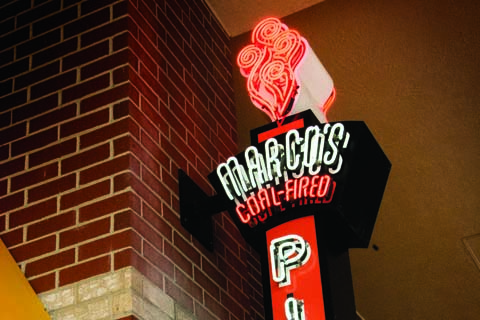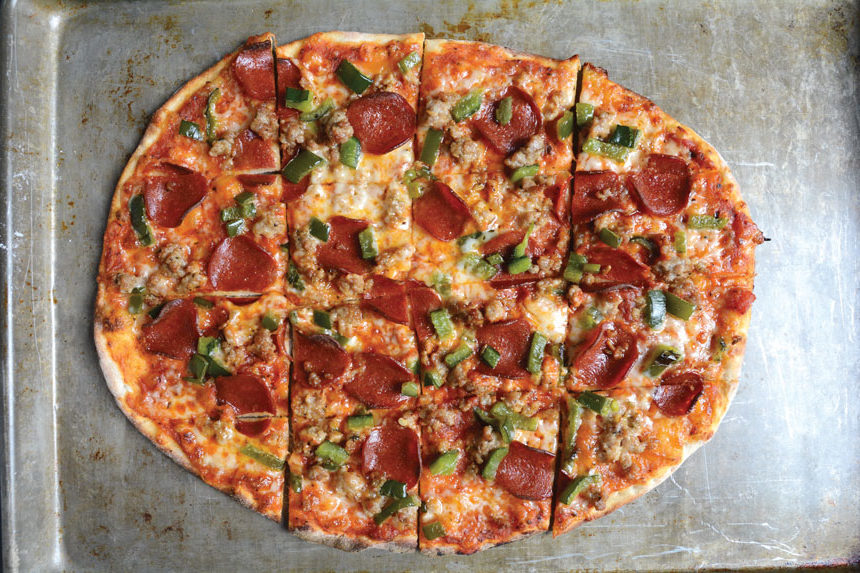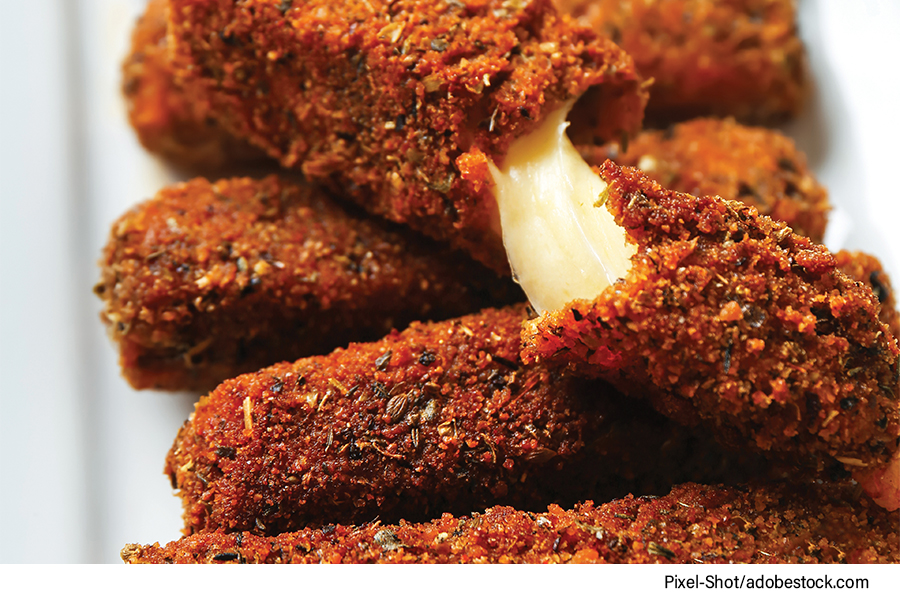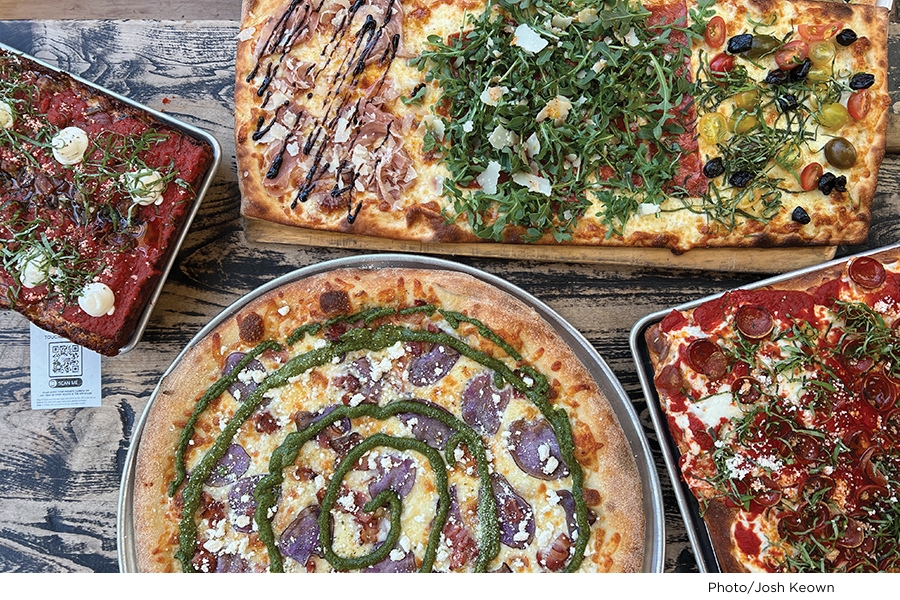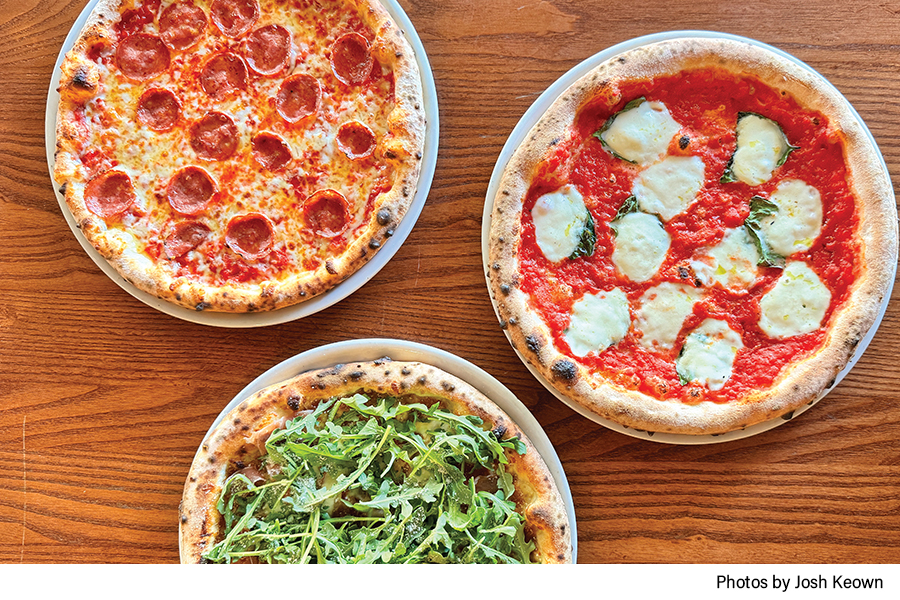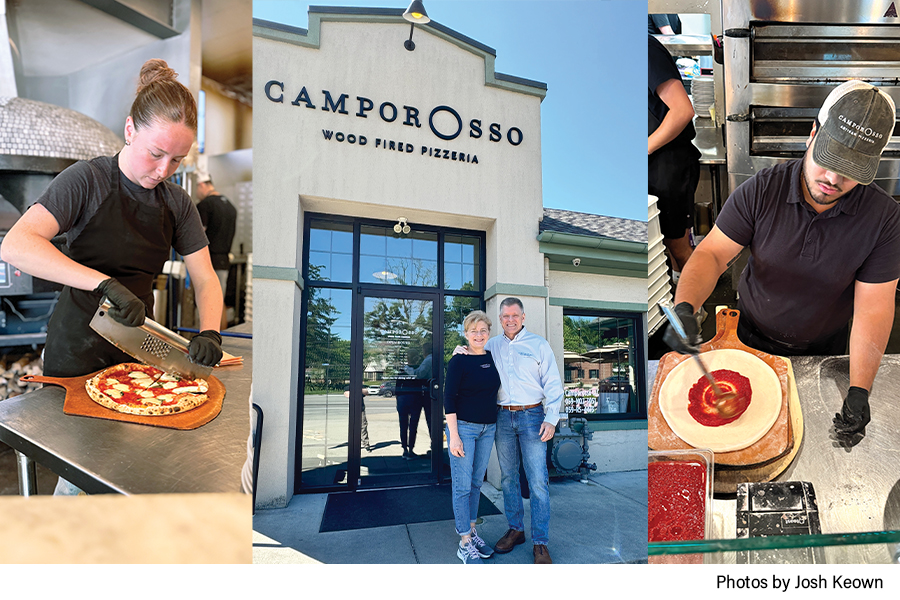[SlideDeck2 id=45282]
Attention to Detail
Colorado’s only VPN-certified pizzeria readies for next step
This summer was an exciting time to visit Marco’s Coal-Fired Pizza at its second location in Denver’s southern suburb of Englewood. With upcoming company growth from two units to four later this year, the restaurant was buzzing with focused and happy employees preparing for new roles with the pizzeria.
 When Pizza Today last visited the thriving pizzeria in 2010, Marco’s Coal-Fired had a single location in the revitalized Ballpark neighborhood in downtown Denver. Upon opening Marco’s Coal-Fired in 2008, owners Mark and Kristy Dym were new to the pizza business and Mark was eager to bring authentic Neapolitan pizza to Denver, a city the couple had never been to.
When Pizza Today last visited the thriving pizzeria in 2010, Marco’s Coal-Fired had a single location in the revitalized Ballpark neighborhood in downtown Denver. Upon opening Marco’s Coal-Fired in 2008, owners Mark and Kristy Dym were new to the pizza business and Mark was eager to bring authentic Neapolitan pizza to Denver, a city the couple had never been to.
Fast-forward seven years — Mark is now an industry veteran who inspires young operators at International Pizza Expo with his passionate demonstrations on Neapolitan pizza styles and seminars on topics like “How to Build your Lunch Business.”
Mark’s devotion to quality reverberates through the entire pizza company. This year, the Englewood pizzeria’s revenue percentage is expected to see a double-digit increase from last year, while the downtown restaurant is on pace for a five-percent rise, Mark says. The 2015 estimates are on top of a banner year in 2014 when Marco’s was recognized as a “Climber”, jumping 10 spots to No. 54 in the Pizza Today Hot 100 Independent Pizzerias list, increasing its year-to-year gross annual sales by $1 million to $4.2 million. Marco’s Coal-Fired Pizza has earned the coveted designation as Pizza Today’s 2015 Independent Pizzeria of the Year.
The Englewood location was already wafting with the smells of a Neapolitan pizzeria when we arrived one Thursday morning to spend the day with our Indie of the Year. First to greet us were none other than Mark and Kristy with ear-to-ear smiles and an embracing welcome.
A tour of the space revealed that though the Englewood restaurant was newly constructed and opened in a commercial plaza in 2011, it resonated a similar feel and look of the total renovation of an 1800s storefront in Ballpark. “We kept a lot of the same elements so that you know you’re in a Marco’s Coal-Fired Pizza, but I didn’t want to duplicate it,” Mark says. “You can’t duplicate 1883.”
 The suburban Marco’s has the same warm color palette of vibrant green and burnt orange blended with wood and iron features — elements that are easily transferable to the new stores that are currently in the design phase. The ample interior is anchored by side-by-side coal- and wood-burning Italian ovens, each weighing 5,500 pounds. The bar area and communal table (which became an instant hit when it was introduced a few months ago), a lounge vibe patio and private dining room give the restaurant seating for more than 200, significantly larger than the 80-seat downtown location we visited later that day.
The suburban Marco’s has the same warm color palette of vibrant green and burnt orange blended with wood and iron features — elements that are easily transferable to the new stores that are currently in the design phase. The ample interior is anchored by side-by-side coal- and wood-burning Italian ovens, each weighing 5,500 pounds. The bar area and communal table (which became an instant hit when it was introduced a few months ago), a lounge vibe patio and private dining room give the restaurant seating for more than 200, significantly larger than the 80-seat downtown location we visited later that day.
As Mark guides us through the restaurant, he shares stories of the pizzeria’s progression. At 52 years old, he and his family set out on this venture after an awe inspiring first bite of Neapolitan-style pizza at Fratelli di Bufala in Miami, Florida. “I don’t know if I could have envisioned this,” he says. “All I knew was, in my head, we were going to be successful.”
Mark took no shortcuts in his efforts to learn the Neapolitan craft and meticulously apply those standards to his pizzeria. He consulted with Roberto Caporuscio, chef-owner of Kesté Pizza & Vino in New York City and U.S. president of the Associazione Pizzaiuoli Napoletani (APN) to learn the Neapolitan way. Caporuscio spent an extended amount of time helping to open the first location and train its pizza makers in APN certification and later to train the opening staff at Englewood.
Mark has sought counsel with some of the industry’s biggest names like Caporuscio and Don Antonio Starita, third-generation owner of one of Naples’ oldest and most revered pizzerias, Pizzeria Starita a Materdei, as well as his distributor and suppliers. The relationships he has built within the industry, Mark says, has been vital to their business success. He adds that his suppliers were instrumental in opening the pizzeria, providing training and guidance and are passionate about how their products are used.
The restaurant has been certified by the Associazione Verace Pizza Napoletana (VPN) and remains the only VPN-certified pizzeria in Colorado. Having “Coal-Fired” in its name, Mark and Caporuscio had to assure VPN officials that Marco’s Neapolitan pizzas are only baked in the wood-fired oven to meet their strict requirements. Other menu favorites are fired by coal.
As Mark shows off his well-designed open kitchen, his face beams and his eyes brighten when he talks about Marco’s pillars of success. “I’m super passionate about this product,” he says. “I’m super passionate about the quality. I’ll never cut a corner. I’d rather charge more or not sell it.
“But I’m just as passionate about my pricing because I am in business to make money. I’m just as passionate about my food cost, my liquor cost and my labor cost.
“My goal is to shoot for 55 percent prime cost, which means I’m running a 45-percent gross profit. That’s a great number,” he says. “Do I always get to 55? No, but I’ll get to 56 or 58, 59. If those numbers are good, then the rest is up to me because the rest is all controllable expenses (rent structure, etc.).”
Throughout every facet of the business, Mark executes tenacity for excellence. “At meetings, I’m always telling my staff, either we are going to be the best or we’re going to be out of business.”
 A guiding principle for the pizza company centers on a big picture ideology. “Marco’s Coal-Fired Pizza, the entity, has to be taken care of,” he says. “I tell this to my employees. It’s got to be bigger than you. It is the same that goes for me. Marco’s Coal-Fired Pizza is taking care of (dozens of) families, including me. We have to do what is good for the business. Part of that is that you treat everybody with decency and respect.”
A guiding principle for the pizza company centers on a big picture ideology. “Marco’s Coal-Fired Pizza, the entity, has to be taken care of,” he says. “I tell this to my employees. It’s got to be bigger than you. It is the same that goes for me. Marco’s Coal-Fired Pizza is taking care of (dozens of) families, including me. We have to do what is good for the business. Part of that is that you treat everybody with decency and respect.”
Marco’s 70 employees are the top priority. Mark adamantly declares: “You know they say ‘the customer comes first.’ No, the employee comes first because if the employee is taken care of, the guest is going to benefit more.” Mark and Kristy incorporate incentivizing employee programs and a dynamic work environment. Nearly 75 percent of the staff at Englewood has been there since day one and more than 40 percent at the Ballpark restaurant.
Higher-than-average pay, bonus options and consistent scheduling, while accommodating vacation and time-off requests, are just a few of the ways the Dyms support their workforce.
“My managers are all on a bonus program,” Mark says. “There are four different components to it, so if they screw one thing up, they don’t lose the whole bonus. Prime cost (food/liquor/labor), owner review, there’s a growth review and then there is an expense component (controllable expenses) — there are percentages to all of these. Every quarter, they get a bonus and they can either get 100 percent of the bonus or none of the bonus.”
Where some restaurants require exhaustive hours for management staff, Marco’s Coal-Fired takes a different approach. “One of the things that I want for the people that work for us, I want them to have quality of life,” Mark says. “It’s just not all about me. It’s about those guys. We try to keep it where they work 50 to 52 hours a week and I want everybody to have two days off in a row. That’s very important.”
Giving employees the tools to be successful is another vital component to the business. That means ensuring all systems and equipment are working at peak performance, Mark says. “Every piece of equipment works perfectly. As soon as something is a little awry we get on it right away. It’s interesting, to us, it’s just second nature. But a lot of people come from kitchens that aren’t running properly.”
Ensuring Marco’s Coal-Fired employees are taken care of produces consistency, and anchor its quality.
As Kristy hands me their latest printed menu, that consistency is evident. She elaborates that only one change was made — exchanging the Queens veggie pizza for the SoHo with breaded eggplant, zucchini, roasted red pepper, oregano, garlic and EVOO on a San Marzano tomato sauce base ($15). “It’s not 100-percent vegan because we use egg to bread the eggplant,” Kristy says. “But we can sell it as a cheeseless option and it’s so flavorful.”
Menu additions must first pass the rigors of testing and Mark’s evaluation. “For me to do something new on our menu, I have to obsess about it for months,” Mark says. He runs a new dish through a gambit of tests to ensure it has the perfect texture and flavor.
 As we sit with Mark and Kristy in a large booth at the front of the now busy restaurant and begin to dive into the menu, three brunch pizzas arrive. The Lombardia ($11) features pancetta, asparagus, roasted potatoes and fresh mozzarella; the Chelsea ($10) is finished with arugula and grape tomatoes over pancetta and fresh mozzarella; and the Vovo Allo Marina ($9) is topped with garlic, Pecorino Romano and oregano leaves on a San Marzano tomato sauce base. All three are baked with a cracked fresh egg. Weekend brunch pizzas passed Mark’s trials to become a Saturday and Sunday draw, served from 11 a.m. to 3 p.m. alongside signature cocktails like the Bottomless Mimosa ($10), Bloody Mary ($3) and Marco’s Mule with vodka, ginger beer and lime ($5).
As we sit with Mark and Kristy in a large booth at the front of the now busy restaurant and begin to dive into the menu, three brunch pizzas arrive. The Lombardia ($11) features pancetta, asparagus, roasted potatoes and fresh mozzarella; the Chelsea ($10) is finished with arugula and grape tomatoes over pancetta and fresh mozzarella; and the Vovo Allo Marina ($9) is topped with garlic, Pecorino Romano and oregano leaves on a San Marzano tomato sauce base. All three are baked with a cracked fresh egg. Weekend brunch pizzas passed Mark’s trials to become a Saturday and Sunday draw, served from 11 a.m. to 3 p.m. alongside signature cocktails like the Bottomless Mimosa ($10), Bloody Mary ($3) and Marco’s Mule with vodka, ginger beer and lime ($5).
Menu mainstays drive guests into the pizzerias. The build-to-order Margherita is the top seller at both locations, followed by the Brooklyn with fresh mozzarella, sweet Italian sausage, pepperoni, mushrooms, red onion, San Marzano tomato sauce and EVOO ($16). The Brooklyn falls under the New York Pies category, a menu designation that allows the pizzeria to offer more traditional New York-style pizza toppings. A Brooklyn native, Mark says, you’ll rarely see a pepperoni pizza in most Neapolitan pizzerias.
There’s one item that can only be ordered at the Englewood location — the fried version of the Dolce Pizza ($10). “First you take the dough and you stretch it,” Mark says. “Then you fry it, put the ricotta mix and honey on it and stick it into the oven and bake. Take it out and finish it with toasted almonds.”
As we witness a packed lunch with a couple table turns and people still flocking in after 1 p.m., Mark attests that the lunch day part was a struggle in the infancy of both locations. Now, the lunch business has become one-third of its sales, thanks to the introduction of a $9 smaller pizza deal that includes a salad and a drink. “And we still make great money with it from a food cost standpoint.”
Though pizza makes up 75 to 80 percent of Marco’s food sales, other items like the Coal-fired Lemoncello Chicken Wings, Meatball Sliders, select pastas and assortment of salads sell well. There are no dogs on Marco’s menu. “If there are, they don’t last long,” Mark says. “I don’t put anything on there that’s not selling.”
Marco’s Coal-Fired was one of the early adopters of menuing a house-made, gluten-free pizza dough. “When I make a batch, I make it by hand,” Mark says, adding in a clean environment. “I get about 13 to 14 dough balls out of each batch. I remember the first week I made it. I threw away about 6 or 7. Now I make over a tray or two a day.” He explains a key factor in dining with someone who is gluten free — that person typically dictates where the entire group eats. Though, he does not recommend Marco’s for Celiac Disease suffers because the pizzeria is not a gluten-free facility.
Mark says the pizzeria concept itself hasn’t changed since Pizza Today’s visit five years ago. Moreover, it’s the little things that have been honed for profitability and efficiency. Those little things encompass the best overall experience for the guests.
“The king is the pizza,” Mark says. “But that is not our product. Our product is the pizza, the chicken wings, the meatballs, the service, the dishes being cleaned, toilet paper in the restrooms, paper towels in the restroom, soap in the soap dispenser… The whole thing, that’s the product. That is what drives people in my opinion. That’s what drives the business is the whole experience.
“Those are the little things you do along the way so you are not sitting on your laurels. You are constantly trying to improve and make stuff better. I always try to get it to look like the day we opened — nice and fresh and clean.”
Recently, the restaurant debuted a new pizza box with better ventilation for the delicate Neapolitan pizza. The investment should come in handy as Marco’s Coal-Fired added a third-party online ordering system at Marcoscoalfiredpizza.com. Though carryout and delivery make up less than 10 percent of its sales, it’s an area that Mark hopes to grow.
Available revenue streams are areas that Mark values in the pizza business compared to other restaurant concepts. As he looks to increase profits at each location, he can dedicate more attention to his carryout, delivery, catering, private dining and/or its mobile unit.
Though an operations line item, the mobile unit also serves a marketing function.
Rather than expensive ad campaigns, Mark puts his marketing efforts into personally reaching out to area businesses and corporations for catering and private dining opportunities, as well as charity and community outreach. Getting corporate dining gigs reap major dividends. “They will have a private party for 20 people,” he says. “That makes the big difference between having a $3,000 day and a $5,000 day.”
Mark says they’ve also built a steady happy hour crowd through specials. “I have a seven-day-a-week happy hour here now, he explains, with $5 wings, meatballs and small Margherita pizzas, as well as drink specials. “Saturday night was a real struggle (at the Englewood pizzeria) for some reason so I started doing half-priced bottles of wine,” he adds. “Since starting that, business has been up 40 percent on Saturdays.”
With two locations and two more on the way, Mark says it’s even more critical to stay focused on the Marco’s Coal-Fired concept. “It’s about simplicity. Keep it simple and do what we do. Take heart in what we’ve learned and that this is what we know how to do.”
Mark and Kristy are looking forward, working to best position the pizza company for its robust growth.
Operation Growth
Mark and Kristy Dym hadn’t intended to schedule the opening of two new Marco’s Coal-Fired Pizza locations in late 2015. The leases just happened to fall in place at the same time. But when an opportunity presents itself, you take it, Mark says. It’s a winning strategy that has helped drive its success from the beginning.
Planning for the significant expansion, the Dyms are making systematic changes. They’ve leaned on the expertise of their distributor and suppliers that Mark considers keys to their business’s success, as well as friends. They’ve also enlisted the help of the high-volume, multi-unit Tutta Bella Neapolitan Pizzeria in Seattle, Washington. Mark says industry expert and Tutta Bella founder Joe Fugere has offered guidance on the blueprints of a thriving multi-unit Neapolitan concept.
Transitioning to four stores, Mark expects his staff to double. In anticipation, the Dyms are revamping their organizational structure to allow for better oversight of the company-wide brand, culture, quality and operations.
“So what we are trying to do now is stay ahead of the game and develop key people that’s going to be our executive team. It’s going to be Kristy and I, an ops manager, marketing/PR, probably have a food and beverage director, then GMs then assistant GMs, kitchen managers,” he says. “We are going to have to add more jobs so it is going to get a little more complicated, for sure.”
Most challenging may be the Casper, Wyoming, location more than 280 miles away. Casper will have its own operations manager. Mark plans to spend the few months during the opening in Wyoming, while Kristy works with key staff to oversee the Golden, Colorado, opening.
Denise Greer is associate editor of Pizza Today.
